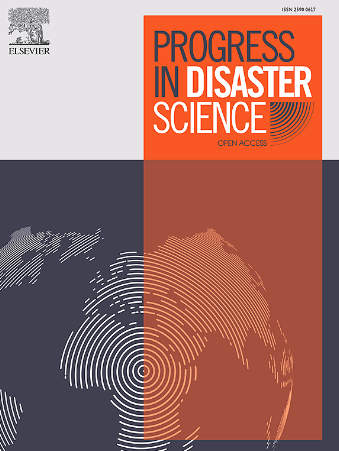灾害应对中的性别观点:基于证据的综述
IF 3.8
Q3 ENVIRONMENTAL SCIENCES
引用次数: 0
摘要
深入了解不同的性别观点、途径和框架对于跨地域的创新和成功的灾害应对和复原力战略至关重要。然而,在大多数地区,推动抗灾能力的性别观点要么缺乏可操作性,要么在研究中有所探索,要么支离破碎,造成不可持续的未来。2019冠状病毒病大流行凸显了这些不平等的后果,个人/性别不成比例的脆弱性变得不可避免。这体现了在具有抗灾能力的景观中建立基于性别包容性视角的安全网的必要性。在这项研究中,系统地审查了80份文件,以探索当前和新兴的性别观点(个人和机构)对跨地域和跨时间的灾害响应和复原机制的看法。研究结果突出了话语中性别和灾害反应定义的理论和概念缺陷。此外,灾害和灾害造成的影响因性别和地区而异。它们还揭示了性别少数群体和历史上被边缘化的社会群体中不成比例的灾害脆弱性。此外,社会经济性别不平等限制了灾害应对中的集体机构,而社会文化和父权制规范导致灾害应对不平衡,性别不平等导致结构性暴力,进一步加剧了这种不平衡。灾害脆弱性的增加增加了对现有机构灾害管理战略的恐惧和不信任。规范性的灾害管理框架巩固了男性在灾害应对中的主导地位,新兴的框架从批判性的女权主义角度出发,不幸的是,女性化的脆弱性和不利地限制了性别包容的未来。众所周知,地域和社会资本影响着人们参与灾害应对的意愿,不分性别和地区。因此,集体社会机构、社会网络和性别包容对灾害响应和社区恢复力的有效性起着催化作用。有效应对灾害的风险沟通应利用学校等社区机构、数字媒体平台和土著知识载体来生成、调解和传播适当的风险信息。五项关键战略可以推动灾害应对和复原力中的性别包容性观点,包括(i)开展基于情境的研究,(ii)使用新的研究方法,如反思性社会学习,(iii)优先将集体机构纳入政策和制度框架,(iv)将研究重点转向揭示脆弱性的历史,以及(v)发展透明和可行的知识传播机制。需要增加参与性的基于证据的研究,政策框架必须强调灾害应对的关键支柱,并将其与新兴的性别赋权观点(例如,在社会、经济、心理、科学/技术、体制和环境)相结合。本文章由计算机程序翻译,如有差异,请以英文原文为准。
Gender perspectives in disaster response: An evidence-based review
An in-depth understanding of diverse gender perspectives, pathways, and frameworks is pivotal for innovative and successful disaster response and resilience strategies across geographies. However, in most regions, gender perspectives in driving disaster resilience are either less operationalized, explored in research, or fragmented, creating unsustainable futures. The ramifications of these inequalities were foregrounded by the COVID-19 pandemic where the disproportionate vulnerability of individuals/genders became unavoidable. This reifies the need to create safety nets within disaster-resilient landscapes based on a gender-inclusive lens. In this study, 80 documents were systematically reviewed to explore the current and emerging gender perspectives (individual and institutional) towards disaster response and resilience mechanisms across geographies and over time. Findings highlight theoretical and conceptual deficits in the definition of gender and disaster response in the discourses. Additionally, disasters and disaster-induced impacts vary over time across genders and regions. They also reveal disproportionate disaster vulnerability among gender minorities and historically marginalized social groups. Furthermore, socioeconomic gender inequalities limit collective agency in disaster response while socio-cultural and patriarchal norms lead to uneven disaster response that are further reinforced by gender inequalities that lead to structural violence. Increased vulnerability to disasters increases fear and mistrust of existing institutional disaster management strategies. Response to Normative disaster management frameworks that entrench masculine dominance in disaster response through, emerging frameworks that draw from a critical feminist lens unfortunately feminize vulnerability and adversely limit gender-inclusive futures. It is acknowledged that place and social capital shape people's willingness to engage in disaster response across genders and regions. Therefore, collective social agency, social networks, and gender inclusion are catalytic towards the efficacy of disaster response and community resilience. Risk Communication for effective disaster response should leverage community institutions like schools, digital media platforms, and indigenous knowledge carriers to generate, mediate, and disseminate appropriate risk information. Five key strategies could drive gender-inclusive perspectives in disaster response and resilience, including (i) conducting context-based studies and research, (ii) use of novel research approaches, such as reflexive social learning, (iii) prioritizing incorporation of collective agency in policy and institutional frameworks, (iv) a research shift and focus towards uncovering the histories of vulnerability, and (v) development of transparent and feasible knowledge dissemination mechanisms. Increased participatory evidence-based research is needed, and policy frameworks must emphasize key pillars of disaster response and integrate them with emerging perspectives on gender empowerment, (e.g., in social, economic, psychological, scientific/technological, institutional, and environmental) arenas.
求助全文
通过发布文献求助,成功后即可免费获取论文全文。
去求助
来源期刊

Progress in Disaster Science
Social Sciences-Safety Research
CiteScore
14.60
自引率
3.20%
发文量
51
审稿时长
12 weeks
期刊介绍:
Progress in Disaster Science is a Gold Open Access journal focusing on integrating research and policy in disaster research, and publishes original research papers and invited viewpoint articles on disaster risk reduction; response; emergency management and recovery.
A key part of the Journal's Publication output will see key experts invited to assess and comment on the current trends in disaster research, as well as highlight key papers.
 求助内容:
求助内容: 应助结果提醒方式:
应助结果提醒方式:


